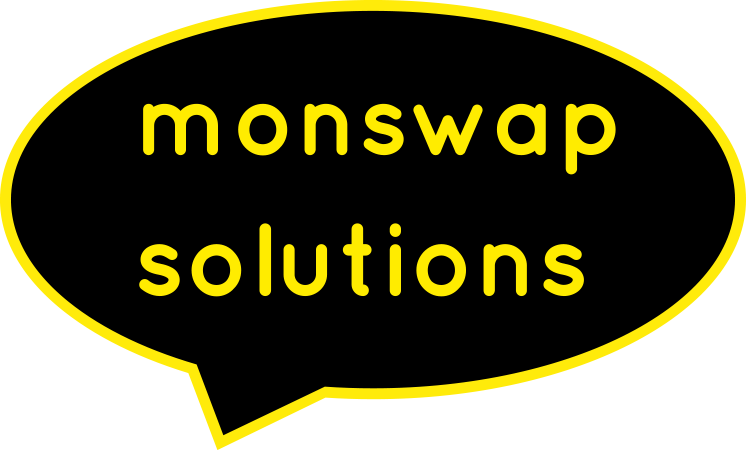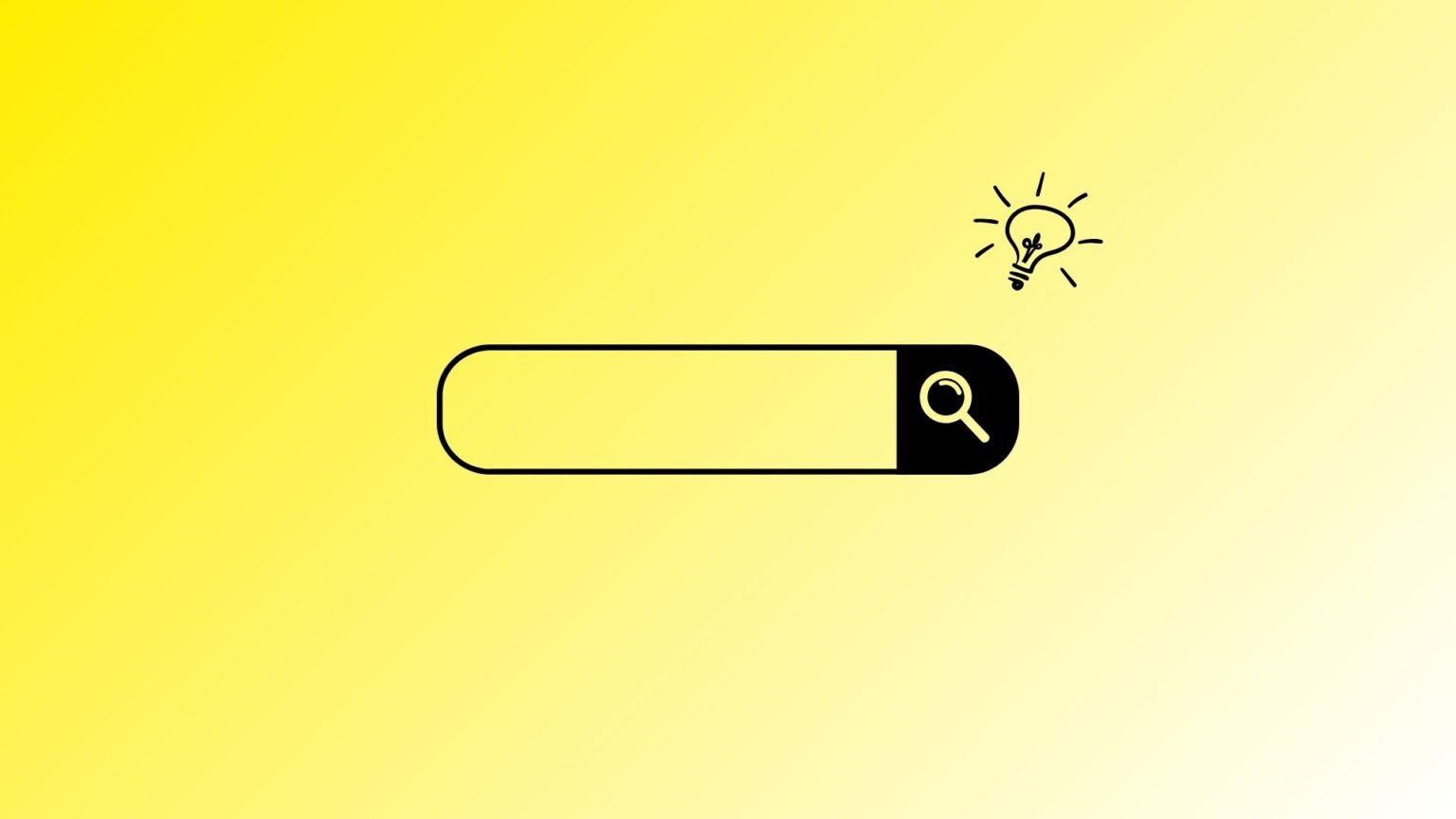I bet you’re looking to translate your SEO website from English to German. But, the “how to” is leaving you with more questions than answers. In this article, I’ll cover some common topics and share my advice as an SEO consultant. I’ll also give you the rundown on what you need to know about German website translation, SEO localisation, and SEO transcreation. Take 5 minutes to read this article before you start translating your web page for the German-speaking market.
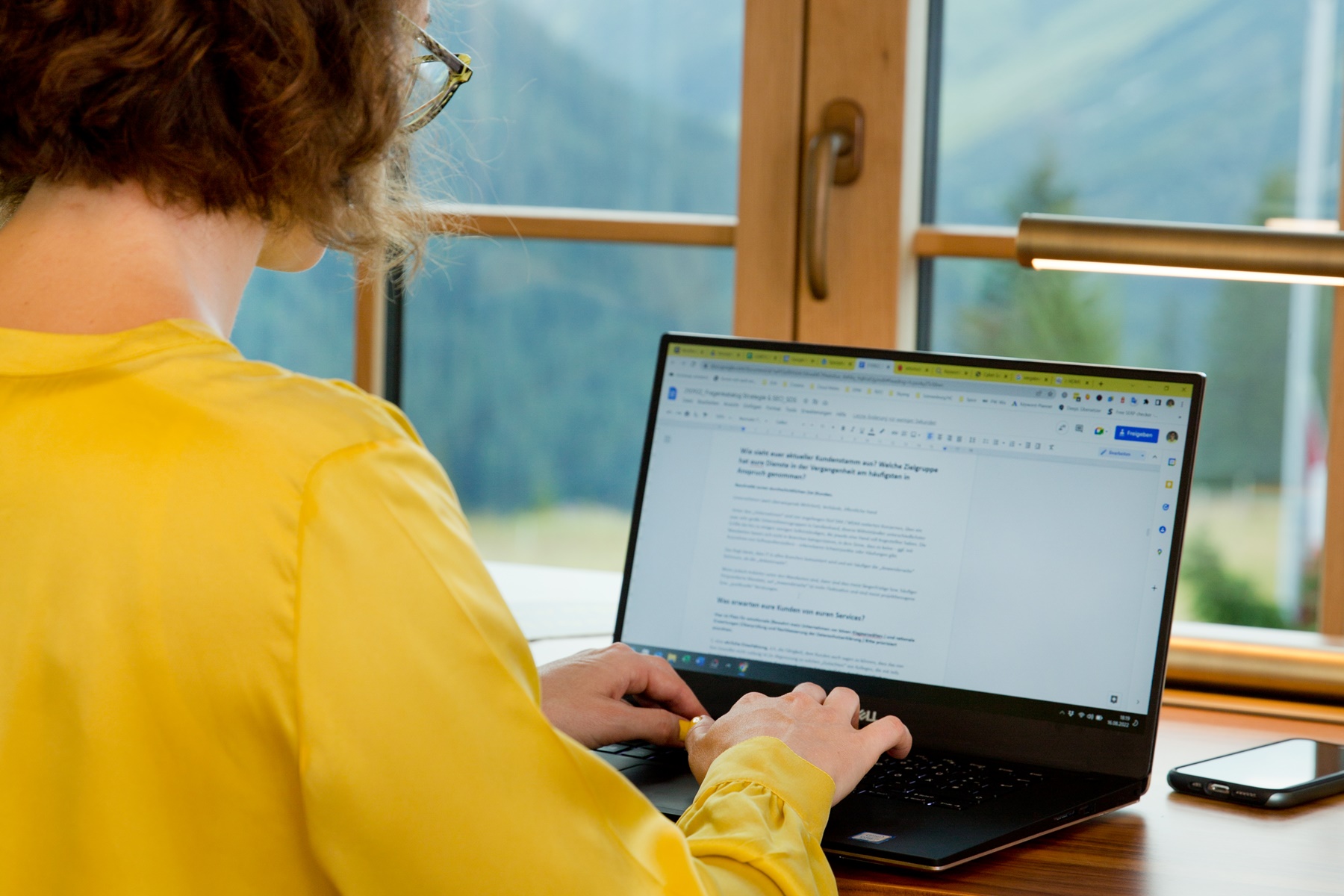
Translating websites – how?
Is it better to have a standard or a search engine optimised translation of your website? What is the difference between (German) SEO translation, SEO localisation, and SEO transcreation? And which of these is the right choice when it comes to translating your website into German?
In short, how do you get a German website translation that attracts customers – and, most importantly, ranks high on google.de?
As a German SEO consultant and copywriter, I deal with multilingual website projects on a daily basis. One of my specialities is the translation of English websites into German.
In this article, I will share some insights and answer questions that my clients often ask me about German website translation. However, most of these insights apply to translating a website into any foreign language.
The first step in (German) website translation
Before you start the translation of your English website or find a (German) SEO translator to do it for you, have a look at your original website:
- Is the content on your website already in line with SEO criteria?
- Does your company work with a strategy for SEO & content marketing?
- Do you have up-to-date metadata (SEO title & meta description) on your website?
- Liegen für Deine Website aktuelle Metadaten (SEO-Title & Meta Description) vor?
- Does it make sense to translate all existing content into German – or just some of it? What content is actually relevant to German-speaking customers? For example, a landing page promoting a cookbook in Welsh will not necessarily be of interest to a German customer.
Depending on your answers to these questions, there are 4 1/2 possible scenarios for a German website translation.

4 1/2 ways to translate your (German) website
The more strategic and high quality your website content is in English, the less work (and cost) you will have to translate it into German. I have seen this time and time again in my years as an SEO translator.
Having said that: What is the right way to translate your website into German? And how do you make sure that customers can find your site on google. de?
Read on and decide which of the following cases best applies to your own website translation project.
1. Classic translation
Your website is not SEO optimised (on purpose).
You don’t want people to find you on Google for a good reason.
For example, one of my clients knew that he was recommended by name for his highly specialised consultancy services. Nobody is going to search for something like that on Google. So after the referral, his clients access his website specifically via a link.
In this case, a classic website translation is a sensible choice.
To this end, have your English website translated 1:1 into good and readable German by a native German speaker.
2. SEO transcreation
Your website is not yet SEO-optimised (but you want it to be eventually).
Your English website copy has not yet been written according to an SEO strategy [], but you want your translated German content to be found on Google?
Then it’s time to think about an SEO transcreation.
Transcreation means that your existing copy is given a thorough overhaul while being translated into another language.
In the case of an SEO transcreation your existing English content will be
- revised according to SEO criteria, i.e. adding keywords, adjusting headings, or shortening paragraphs.
- adapted for the target language: cultural particularities such as currency, measurements, regional holidays or customs are changed and adjusted.
A keyword research and SEO strategy in the target language (German) is the starting point for such an SEO transcreation. A professional content strategy means that your website can be placed at the top of search engines such as Google, Yahoo! and Bing – both domestically and in German-speaking countries.
3. SEO translation
Your original English content is already optimised for search engines.
If your existing content has been created based on an SEO content strategy, I recommend an SEO translation to convert your website copy into German.
The first step in an SEO translation is to translate the keywords and have them checked by the SEO translator. This is because keywords and search intent often differ from one culture to another. Therefore, a keyword cannot necessarily be translated 1:1 literally from the source language into German.
For example, before I start with a German website translation, I need to ask myself:
Should I literally translate the original English keyword “seo translation” to “seo übersetzung” ‒ or rather choose a more economic search intent “seo übersetzer” (SEO translator)?
To know the answer, I work with keyword tools
Those SEO tools show me the numbers. They help me to make the right decisions for a German keyword translation before I start the actual translation of the website.
This screenshot from the SEO tool KWFinder shows that for a blog post I can get 10 times as many searches for ‘SEO translation’ as for ‘SEO translator’. So I optimise the text for ‘SEO translation’.
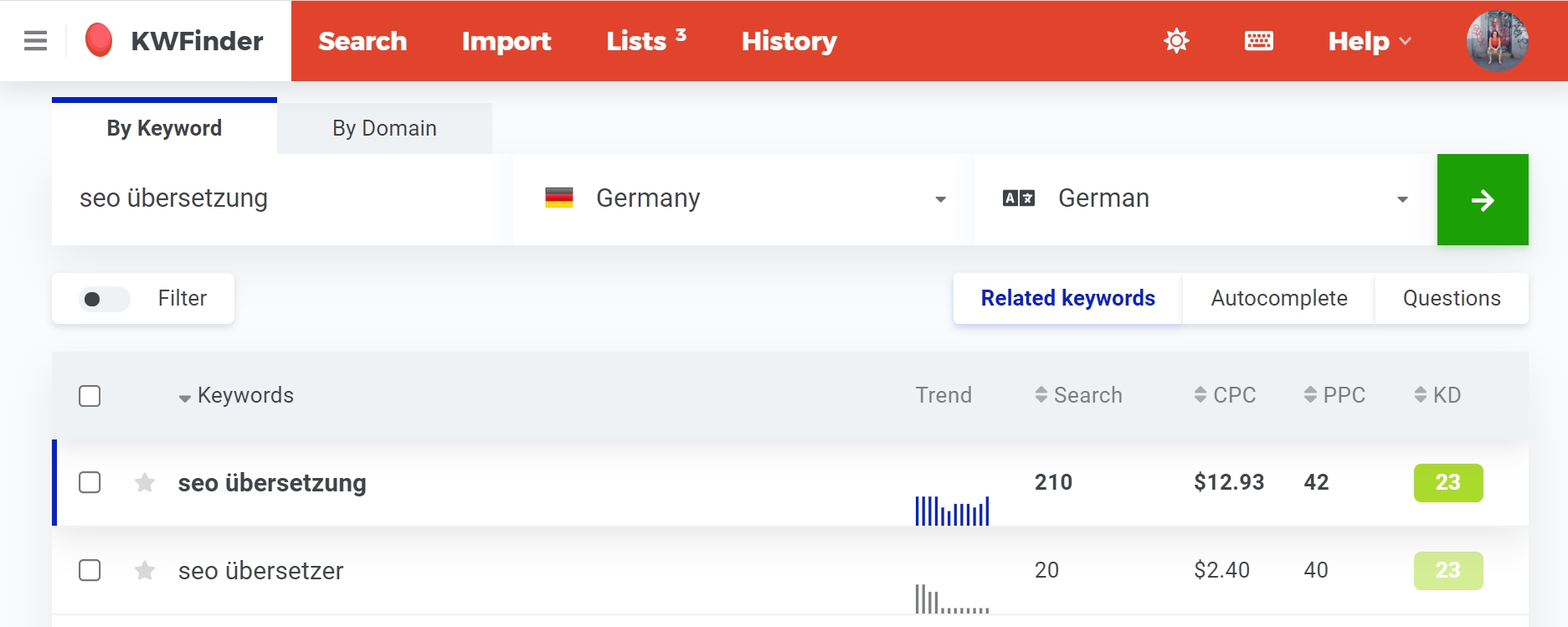
When translating a website, I first adapt the existing SEO content strategy to the target language based on these keyword translations.
I then translate the SEO content itself into German and, if necessary, adapt its meaning to the modified keywords.
Once the SEO translation is complete, your German website can also rank at the top of Google in Germany, Switzerland, or Austria. Plus, a solid SEO translation will also contribute to the overall SEO performance of your original website.
Sounds a bit complicated. Well, it is. That’s why I recommend working with an experienced SEO translator for website translations.
4. Website localization
Your original website is already SEO-optimised but content needs to be adapted for German-speaking clients.
If your English website is already SEO-optimised, but designed for your original market, things get a little more complex. In addition to SEO translation, it is also necessary to localise the translated SEO content.
SEO localisation (or SEO localization, as the Americans call it) focuses on cultural aspects that cannot be translated literally. For example
- Units of measurement
- Address formats
- DIN standards
- Public holidays
- Punctuation marks
- etc.
During localisation, an SEO translator translates the website copy to German and at the same time adapts these cultural nuances so that any German user can understand the full meaning of your web content.
It’s a good idea to make sure your SEO translator has some experience in user experience and UX writing. That way, your main menu and buttons will also remain user-friendly.
It’s not just about SEO. Localising your German website is also key to giving users a great experience and making them feel at ease. After all, if they don’t understand what you’re offering, they won’t trust you enough to buy.
4 1/2. Create new SEO content in your target language
You’re absolutely right: Writing new content isn’t the same as translation. (Hence the ½.) I just wanted to mention this as a possibility.
If you notice that your German-speaking customers have different questions and needs than your local customers, you can include these topics in a multilingual SEO strategy and create new German SEO content that’s specifically targeted to them.
1, 2, 3, 4 or 4 1/2? It might be a good idea to get advice from a German SEO specialist before you start your German website translation project.
So, which parts of your website should you translate?
When translating your website with SEO in mind, you should make sure that the translation is 100% complete. For the best user experience, all content should be translated into the target language.
This means translating not only SEO copy, but all other types of content as well. In many German website translation projects, certain pieces of content are often overlooked.
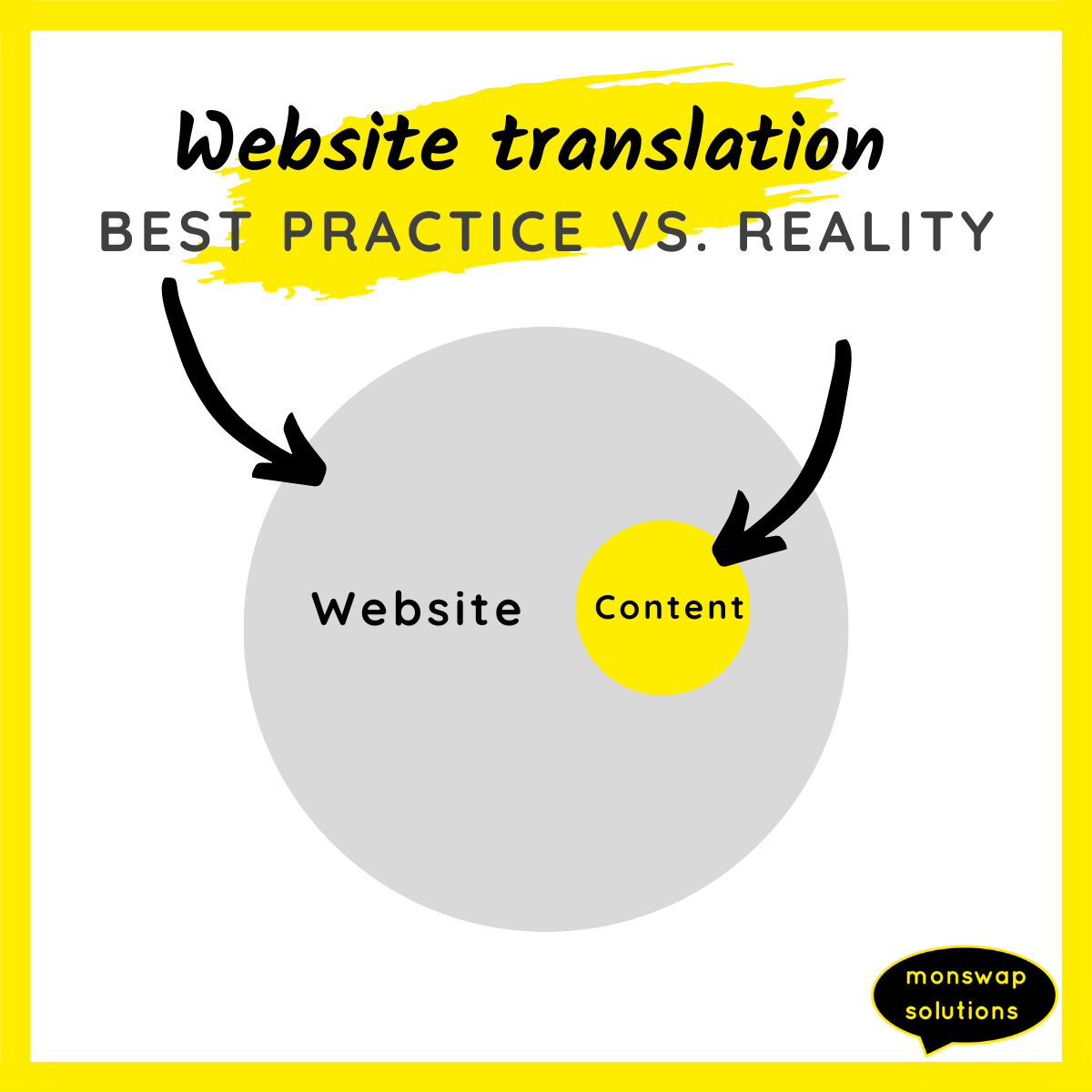
In addition to SEO copy, you should translate the following elements:
- Alt texts
- Captions
- H1 headline & subheadings
- Keywords
- Markups for structured data
- Meta Descriptions
- Open Graph Tags
- SEO titles
- Title tags in links
- URLs of all pages and image content
- Error messages
- Imprint, privacy policy, terms and conditions
If you keep all these elements in mind, your SEO translation and multilingual website success will be a breeze.
PS: If you want to compare this blog post: You can find its German SEO translation here.
What clients ask me about German website translation…
Here are some questions that clients ask me before I translate their website from English to German.
Counter question: Do you want your website to be found on Google by over 100 million people in Germany, Austria, and Switzerland? And have them buy your products and book your services?
I’d say yes.
An SEO translation is more than a 1:1 translation from the source language, e.g. a website translation from English to German.
On the contrary, when translating SEO content, you need to consider several factors. These include
– keyword density
– length paragraphs and sentences
– word count
– text structure
– language difficulty (and a few more).
It’s also important to adapt SEO copy to suit the specific characteristics of each target country. If you want your website to rank well in search results, you need to localise your SEO content.
Keywords are a great example of this: You can’t just translate them word for word into another language. As an SEO translator, I often need to research keywords in German before I start translating – and even adjust the overall SEO strategy accordingly.
If you want to rank in German-speaking markets, it’s a good idea to have your website translated into German.
Translators who work on your website need more than just translation skills: as SEO translators, they should also be well versed in search engine optimisation.
Therefore, when it comes to translating SEO content for websites and adapting it to the requirements of the target markets, you should always find a professional SEO translator with a high level of SEO expertise.
Such SEO translators not only translate each piece of content. They will also pay particular attention to the SEO localisation of the keywords within the content. This is because the way people search for information varies greatly from country to country and culture to culture.
The only way to ensure that your website is found by your target audience is to work with an SEO translator who understands this.
